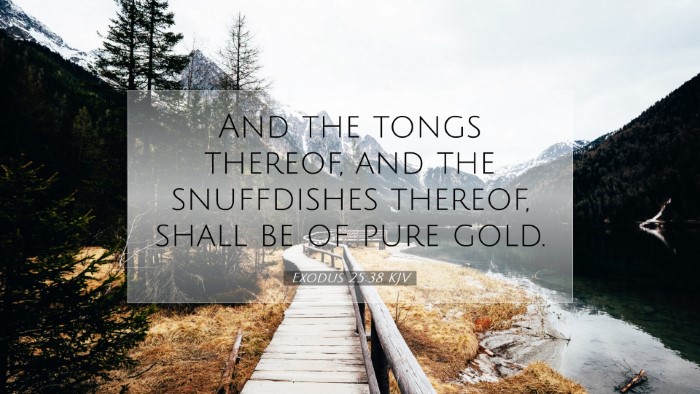Commentary on Exodus 25:38
Verse: Exodus 25:38 - "And the tongs thereof, and the snuff-dishes thereof, shall be of pure gold."
Introduction
This verse concludes the instruction regarding the construction of the golden candlestick (Menorah) and accompanying accessories within the Tabernacle. The meticulous specifications provided by God to Moses reveal the significance of each element used in the Tabernacle's service.
Symbolism of Materials
Divine Instructions for Sacred Items: According to Adam Clarke, the use of pure gold symbolizes the divine nature and glory of God. Gold is often associated with purity, divinity, and eternal value. The details surrounding the tongs and snuff-dishes suggest that even the smallest aspects of worship—every item used—must reflect the holiness of God.
The Importance of Holiness: Matthew Henry emphasizes that all implements used in the worship of God should be made with care and reverence, corresponding to their purposes in the service of God. The utensils mentioned here play vital roles in maintaining the candlestick and ensuring that the light continually shines within the Holy Place, representing the divine illumination provided by God's presence.
The Function of the Tongs and Snuff-Dishes
- Tongs: The tongs were utilized to handle the lamps, ensuring that the priests could maintain the light without fear of extinguishing it unwittingly. This underscores the importance of vigilance in maintaining one's spiritual light. Albert Barnes notes that this symbolizes our responsibility to uphold the light of Christ in the lives of believers.
- Snuff-Dishes: Snuff-dishes were meant for collecting the burnt wick trimmings from the lamps. This act was crucial as burnt wicks would otherwise emit smoke, representing the need for the church to regularly purify its worship to keep the light of Christ untainted. Henry expounds on the idea that believers are called to cast away anything that could sully their witness of Christ.
Theological Implications
Holiness in Worship: The requirement for all utensils to be of pure gold signifies that God's expectations extend to the quality of our lives and worship. Clarke suggests that God prescribes for His house what is most excellent, encouraging leaders in the church today to strive for purity and excellence in their ministry and teachings.
Reflection of Christ: As the gold signifies Christ’s divinity, the use of these utensils can be interpreted within the broader narrative of Scripture, revealing deeper insights into the nature of Jesus as the light of the world (John 8:12). Barnes emphasizes this connection, noting that Christ, the true light, requires us to maintain our lamps—our lives—filled with His Spirit.
Practical Applications for Believers
Maintaining Spiritual Vigilance: Just as the priests were tasked with the upkeep of the light in the Tabernacle, believers today are called to be vigilant in their spiritual lives. This requires regular self-examination and addressing any issues that might cause spiritual darkness.
Quality of Ministry: The principle of using precious materials for sacred purposes challenges current believers, especially pastors and leaders, to evaluate the importance of quality in their service to God. Matthew Henry points out that this principle of excellence should extend not only to physical worship but also to the quality of the message preached and the lives lived in service to others.
Conclusion
The contents of Exodus 25:38, while seemingly practical instructions, echo with profound theological and practical insights for today’s believers. The significance of gold in the construction of the sacred items reflects God's nature and the ultimate purpose of His house. As heirs of the new covenant, understanding these principles enhances our appreciation of the sanctity of worship and encourages us to embody the light of Christ more fully in our lives.


